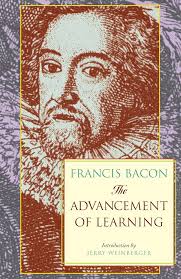The Advancement of Learning Page #26
The Advancement of Learning, published by Francis Bacon in 1605, is a foundational text in the history of science and philosophy. In this work, Bacon advocates for empirical research and the systematic organization of knowledge, laying the groundwork for the scientific method. The book critiques existing scholarly practices and proposes a new approach to learning based on observation and experimentation. It marks a significant shift towards modern scientific inquiry.
- Year:
- 1605
- 1,169 Views
Submitted by acronimous on August 11, 2024
Modified by acronimous on August 11, 2024
meet in one age. For so the prophet Daniel speaking of the latter times foretelleth, Plurimi pertransibunt, et multiplex erit scientia: as if the openness and through-passage of the world and the increase of knowledge were appointed to be in the same ages; as we see it is already performed in great part: the learning of these later times not much giving place to the former two periods or returns of learning, the one of the Grecians, the other of the Romans. III. (1) History ecclesiastical receiveth the same divisions with history civil: but further in the propriety thereof may be divided into the history of the Church, by a general name; history of prophecy; and history of providence. The first describeth the times of the militant Church, whether it be fluctuant, as the ark of Noah, or movable, as the ark in the wilderness, or at rest, as the ark in the Temple: that is, the state of the Church in persecution, in remove, and in peace. This part I ought in no sort to note as deficient; only I would that the virtue and sincerity of it were according to the mass and quantity. But I am not now in hand with censures, but with omissions. (2) The second, which is history of prophecy, consisteth of two relatives—the prophecy and the accomplishment; and, therefore, the nature of such a work ought to be, that every prophecy of the Scripture be sorted with the event fulfilling the same throughout the ages of the world, both for the better confirmation of faith and for the better illumination of the Church touching those parts of prophecies which are yet unfulfilled: allowing, nevertheless, that latitude which is agreeable and familiar unto divine prophecies, being of the nature of their Author, with whom a thousand years are but as one day, and therefore are not fulfilled punctually at once, but have springing and germinant accomplishment throughout many ages, though the height or fulness of them may refer to some one age. This is a work which I find deficient, but is to be done with wisdom, sobriety, and reverence, or not at all. (3) The third, which is history of Providence, containeth that excellent correspondence which is between God’s revealed will and His secret will; which though it be so obscure, as for the most part it is not legible to the natural man—no, nor many times to those that behold it from the tabernacle—yet, at some times it pleaseth God, for our better establishment and the confuting of those which are as without God in the world, to write it in such text and capital letters, that, as the prophet saith, “He that runneth by may read it”—that is, mere sensual persons, which hasten by God’s judgments, and never bend or fix their cogitations upon them, are nevertheless in their passage and race urged to discern it. Such are the notable events and examples of God’s judgments, chastisements, deliverances, and blessings; and this is a work which has passed through the labour of many, and therefore I cannot present as omitted. (4) There are also other parts of learning which are appendices to history. For all the exterior proceedings of man consist of words and deeds, whereof history doth properly receive and retain in memory the deeds; and if words, yet but as inducements and passages to deeds; so are there other books and writings which are appropriate to the custody and receipt of words only, which likewise are of three sorts—orations, letters, and brief speeches or sayings. Orations are pleadings, speeches of counsel, laudatives, invectives, apologies, reprehensions, orations of formality or ceremony, and the like. Letters are according to all the variety of occasions, advertisements, advises, directions, propositions, petitions, commendatory, expostulatory, satisfactory, of compliment, of pleasure, of discourse, and all other passages of action. And such as are written from wise men, are of all the words of man, in my judgment, the best; for they are more natural than orations and public speeches, and more advised than conferences or present speeches. So again letters of affairs from such as manage them, or are privy to them, are of all others the best instructions for history, and to a diligent reader the best histories in themselves. For apophthegms, it is a great loss of that book of Cæsar’s; for as his history, and those few letters of his which we have, and those apophthegms which were of his own, excel all men’s else, so I suppose would his collection of apophthegms have done; for as for those which are collected by others, either I have no taste in such matters or else their choice hath not been happy. But upon these three kinds of writings I do not insist, because I have no deficiences to propound concerning them. (5) Thus much therefore concerning history, which is that part of learning which answereth to one of the cells, domiciles, or offices of the mind of man, which is that of the memory. IV. (1) Poesy is a part of learning in measure of words, for the most part restrained, but in all other points extremely licensed, and doth truly refer to the imagination; which, being not tied to the laws of matter, may at pleasure join that which nature hath severed, and sever that which nature hath joined, and so make unlawful matches and divorces of things—Pictoribus atque poetis, &c. It is taken in two senses in respect of words or matter. In the first sense, it is but a character of style, and belongeth to arts of speech, and is not pertinent for the present. In the latter, it is—as hath been said—one of the principal portions of learning, and is nothing else but feigned history, which may be styled as well in prose as in verse. (2) The use of this feigned history hath been to give some shadow of satisfaction to the mind of man in those points wherein the nature of things doth deny it, the world being in proportion inferior to the soul; by reason whereof there is, agreeable to the spirit of man, a more ample greatness, a more exact goodness, and a more absolute variety, than can be found in the nature of things. Therefore, because the acts or events of true history have not that magnitude which satisfieth the mind of man, poesy feigneth acts and events greater and more heroical. Because true history propoundeth the successes and issues of actions not so agreeable to the merits of virtue and vice, therefore poesy feigns them more just in retribution, and more according to revealed Providence. Because true history representeth actions and events more ordinary and less interchanged, therefore poesy endueth them with more rareness and more unexpected and alternative variations. So as it appeareth that poesy serveth and conferreth to magnanimity, morality and to delectation. And therefore, it was ever thought to have some participation of divineness, because it doth raise and erect the mind, by submitting the shows of
Translation
Translate and read this book in other languages:
Select another language:
- - Select -
- 简体中文 (Chinese - Simplified)
- 繁體中文 (Chinese - Traditional)
- Español (Spanish)
- Esperanto (Esperanto)
- 日本語 (Japanese)
- Português (Portuguese)
- Deutsch (German)
- العربية (Arabic)
- Français (French)
- Русский (Russian)
- ಕನ್ನಡ (Kannada)
- 한국어 (Korean)
- עברית (Hebrew)
- Gaeilge (Irish)
- Українська (Ukrainian)
- اردو (Urdu)
- Magyar (Hungarian)
- मानक हिन्दी (Hindi)
- Indonesia (Indonesian)
- Italiano (Italian)
- தமிழ் (Tamil)
- Türkçe (Turkish)
- తెలుగు (Telugu)
- ภาษาไทย (Thai)
- Tiếng Việt (Vietnamese)
- Čeština (Czech)
- Polski (Polish)
- Bahasa Indonesia (Indonesian)
- Românește (Romanian)
- Nederlands (Dutch)
- Ελληνικά (Greek)
- Latinum (Latin)
- Svenska (Swedish)
- Dansk (Danish)
- Suomi (Finnish)
- فارسی (Persian)
- ייִדיש (Yiddish)
- հայերեն (Armenian)
- Norsk (Norwegian)
- English (English)
Citation
Use the citation below to add this book to your bibliography:
Style:MLAChicagoAPA
"The Advancement of Learning Books." Literature.com. STANDS4 LLC, 2025. Web. 9 Mar. 2025. <https://www.literature.com/book/the_advancement_of_learning_3165>.








Discuss this The Advancement of Learning book with the community:
Report Comment
We're doing our best to make sure our content is useful, accurate and safe.
If by any chance you spot an inappropriate comment while navigating through our website please use this form to let us know, and we'll take care of it shortly.
Attachment
You need to be logged in to favorite.
Log In